Key Takeaways:
- Most people experience their fastest weight loss in the first year after surgery.
- Weight loss typically slows and stabilizes between 12 and 18 months post-surgery.
- Your personal weight loss timeline depends on factors such as the type of surgery you underwent, how well you follow post-surgical guidelines, and your individual metabolism.
Right after bariatric weight loss surgery, you’ll notice a dramatic loss in weight within the first year. For the next few years, your weight loss will continue, albeit at a slower rate. You may also experience weight loss plateaus from time to time.
While everyone’s weight loss journey is unique, a typical timeline can help you set realistic expectations and stay motivated throughout the process.
Table of Contents
Initial Weight Loss: The First Few Weeks
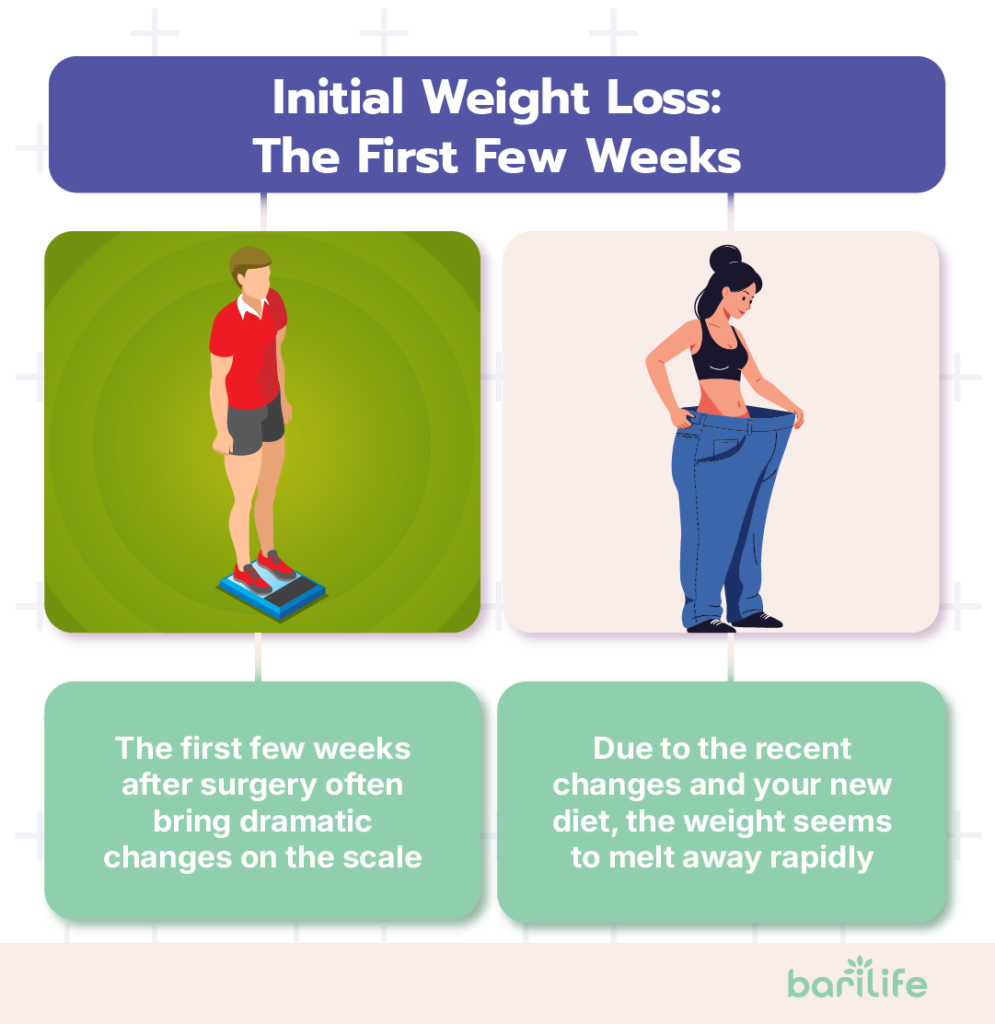
The first few weeks after surgery often bring dramatic changes on the scale. Many people call this the “honeymoon phase” because the weight seems to melt away rapidly. During this period, you might lose two to four pounds per week or even more.
There are several reasons why this happens so quickly.
- First, you’ll be on a very low-calorie liquid diet immediately after the procedure. This diet begins with clear liquids, such as water, broth, and sugar-free gelatin, for a few days. Then, you’ll progress to full liquids like protein shakes, strained soups, and sugar-free pudding.
- Second, your new, smaller stomach can only hold a small amount of food, typically just one to two ounces, immediately after surgery. This significantly reduces the number of calories you can consume.
- Third, some procedures, such as gastric bypass, also reduce the number of calories your body absorbs from food.
Your diet will gradually progress during these early weeks. Around weeks two to three, you’ll typically transition to pureed foods, which have a consistency similar to baby food.
By weeks four to six, you’ll begin trying soft, moist foods. This careful progression helps your body heal as it adjusts to your new digestive system.
Short-Term Weight Loss (First 3-6 Months)
After the initial few weeks, weight loss continues steadily, though the pace may slow slightly. By three to six months after surgery, many individuals have lost 20–40% of their excess body weight, depending on the procedure they had and how well they adhere to the dietary and lifestyle guidelines.
This phase is marked by a transition to more regular eating patterns. Patients begin to consume soft and solid foods, gradually increasing portion sizes while focusing on high-protein, low-sugar options. Your appetite may still be minimal at this time.
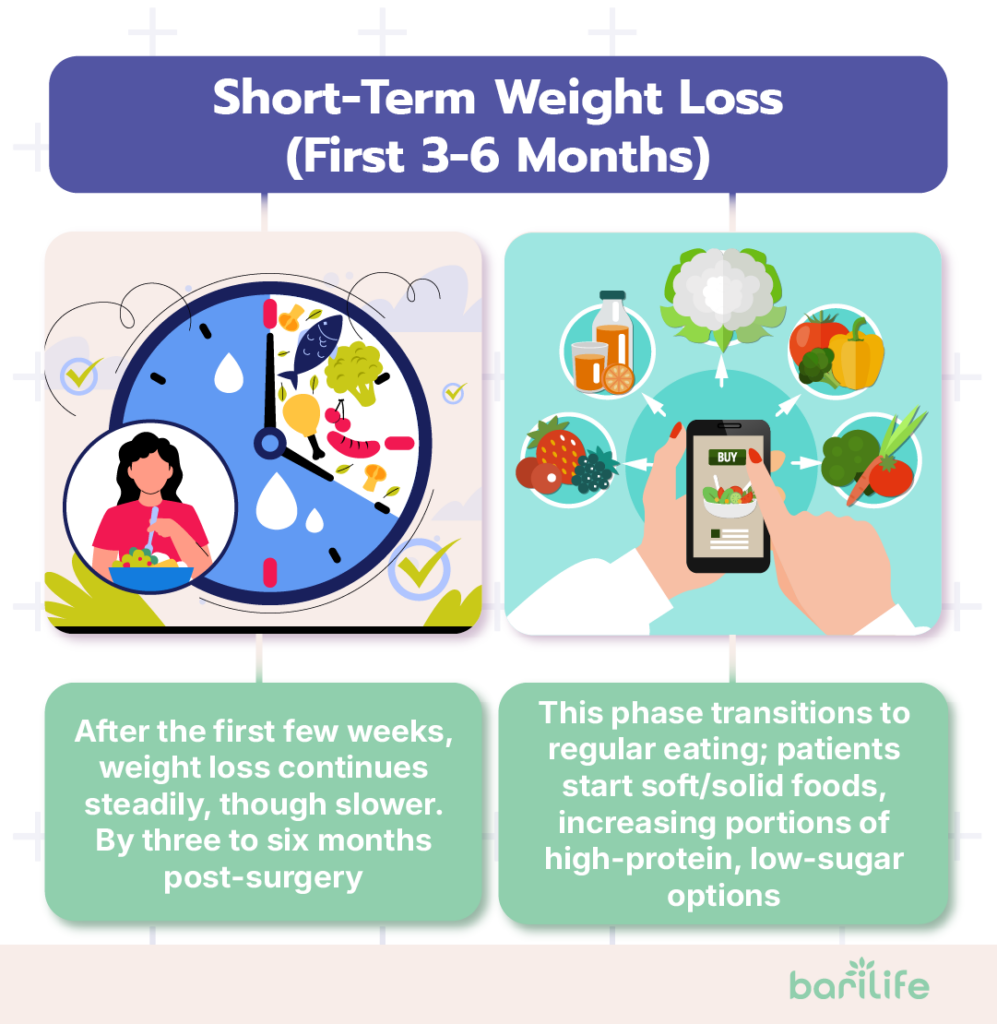
Your hormone shifts also play a role in weight loss during this period. Bariatric surgery alters gut hormones like ghrelin, which is responsible for stimulating hunger. Studies suggest that these changes contribute to reduced appetite and improved blood sugar control.
It’s also common for people to become more active during this time, which helps increase metabolism and preserve lean muscle mass.
If you’re wondering how much weight can you lose with bariatric surgery, keep in mind that your body typically drops a significant amount — sometimes up to 30–50% of your excess weight — within the first 6 months.
Long-Term Weight Loss (6-18 Months)
From six months onward, weight loss typically slows to about one to two pounds per week. This is expected.
Most people reach their lowest weight around 12-18 months after surgery. In one year, the average person loses about 50-60% of their excess weight, though results vary.
By 18 months, most people reach a weight plateau where the number on the scale stabilizes. This doesn’t mean the surgery “stopped working” – it’s a normal part of the process. Some people continue to lose small amounts of weight in their second year, especially with consistent exercise and careful attention to nutrition.
Factors Affecting Weight Loss Speed
The type of procedure you had makes a significant difference. Gastric bypass typically produces faster and greater total weight loss than sleeve gastrectomy, which in turn usually works better than adjustable gastric banding. This is because different procedures affect digestion and absorption in varying ways.
Your starting body mass index (BMI) also affects your rate of loss. People with higher starting weights tend to lose more pounds quickly, though the percentage of excess weight lost may be similar.
Age also plays a role, with younger people losing weight faster than older adults due to their higher metabolism and fewer health complications.
Perhaps the most important factor you can control is how closely you follow the post-surgery guidelines. People who carefully follow their nutrition plan, exercise regularly, attend follow-up appointments, and take recommended supplements typically lose weight more quickly and maintain it better long-term.
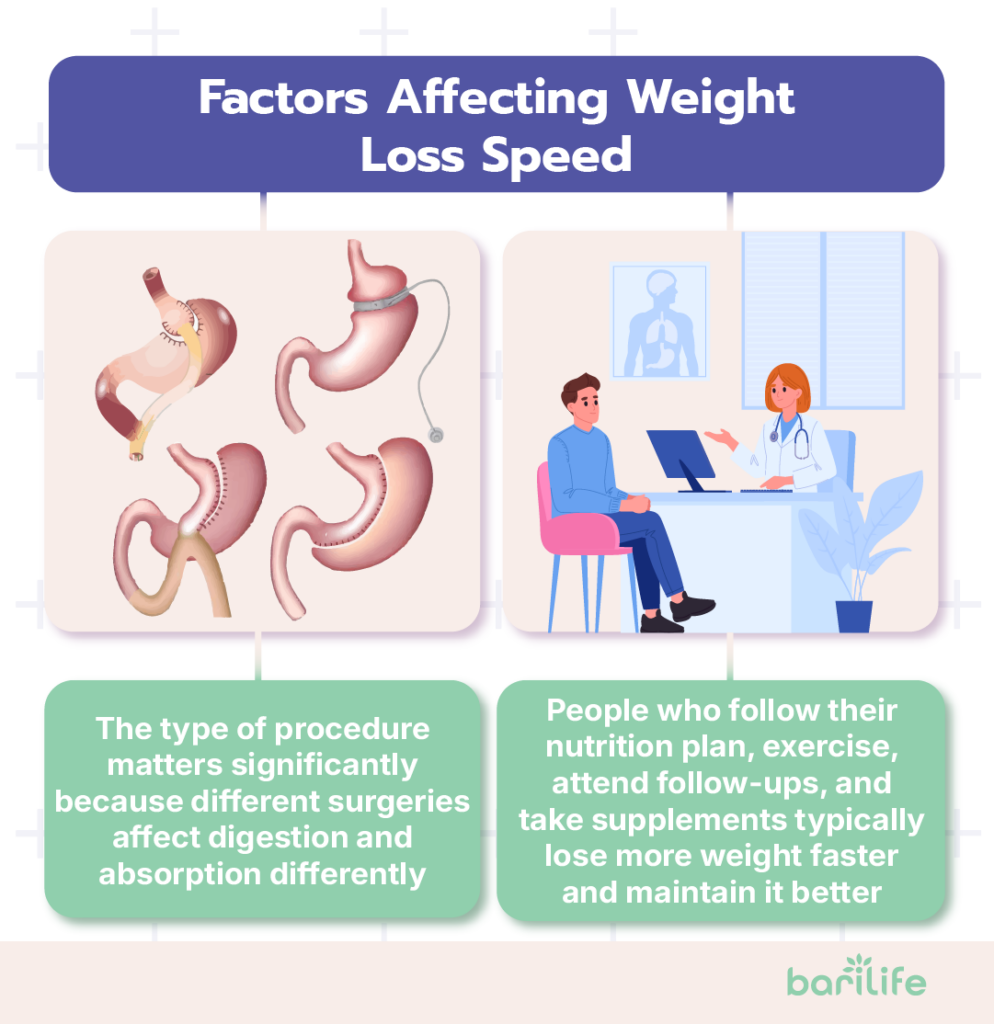
Other factors include your gender (men often lose weight faster than women), any medical conditions you have (like hypothyroidism, which can slow weight loss), and your genetics, which influence how your body responds to dietary changes.
Nutritional Guidelines Post-Surgery
Following proper nutrition guidelines not only supports faster weight loss but also helps prevent complications and nutritional deficiencies.
Protein becomes your nutritional priority after surgery. Most people need 60-80 grams daily to prevent muscle loss during rapid weight loss. Good sources of lean meats include:
- Poultry
- Fish
- Eggs
- Low fat dairy
- Protein supplements designed for bariatric patients
You’ll also require daily supplementation of vitamins and minerals for life after bariatric surgery. Your body simply can’t get all the nutrients it needs from the small amounts of food you eat, and some procedures reduce nutrient absorption.
Most people need a high-quality multivitamin, calcium with vitamin D, vitamin B12, and sometimes iron.
Hydration is also important, but how you drink changes. Talk with your medical provider about how much you need to drink daily to remain hydrated Also, avoid drinking any liquid 30 minutes before, during, and 30 minutes after meals to prevent overfilling your stomach.
Following these guidelines closely helps ensure you lose weight at an optimal rate while staying healthy and feeling your best.
Plateaus and Long-Term Weight Management
Almost everyone experiences plateaus after bariatric surgery. Plateaus are periods where the scale doesn’t budge despite your best efforts. When the plateau occurs varies from person to person.
They happen when the body is adjusting to its new state and working to achieve balance. They’re frustrating but completely normal and temporary.
When you hit a plateau, reevaluate your habits:
- Are you measuring portion sizes accurately?
- Have you been less active lately?
- Are you drinking enough water?
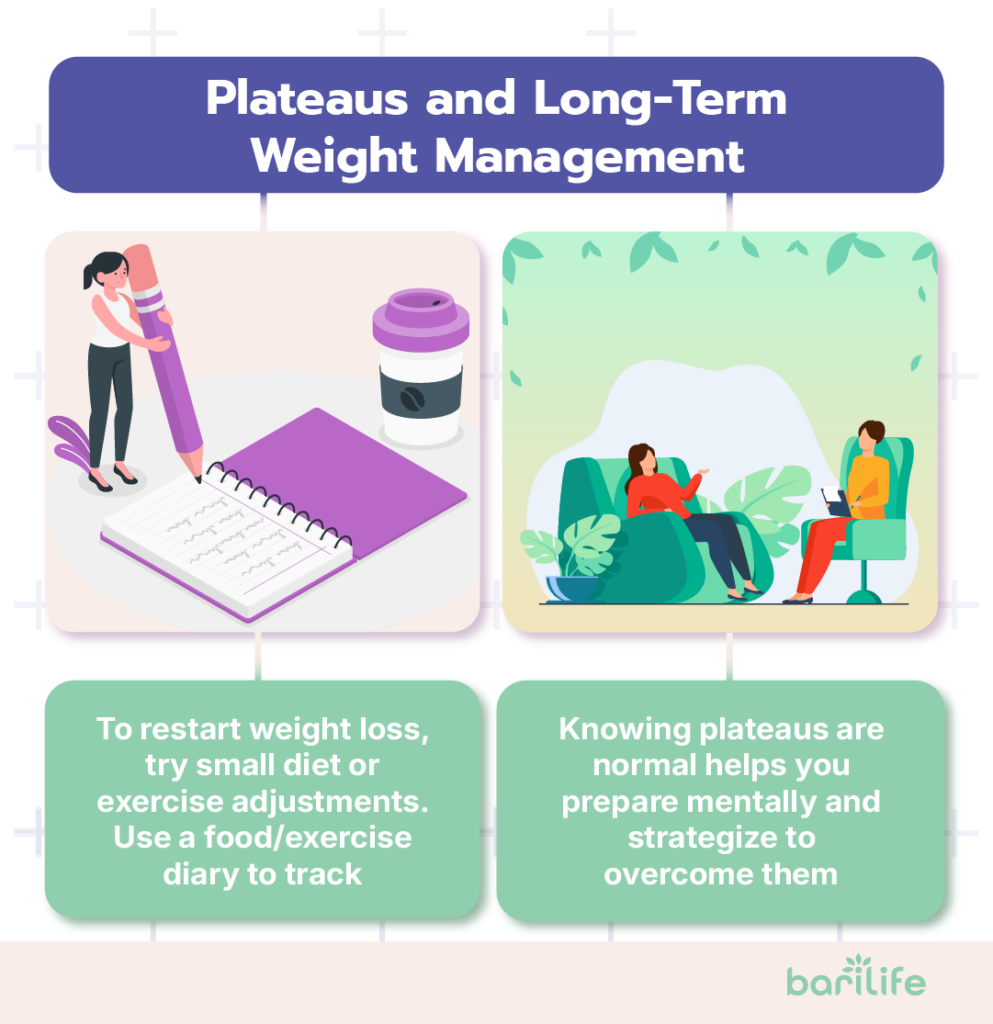
Sometimes, minor adjustments to diet or exercise can help restart weight loss. Try keeping a food and exercise diary to keep track of your daily habits.
About 20-30% of people regain significant weight two to five years after surgery. Knowing that plateaus and challenges are normal parts of the journey helps you prepare mentally and develop strategies to overcome them.
Risks and Considerations
While bariatric surgery is generally safe and effective, you should also be aware that it has risks and challenges.
Surgical complications include:
- Infection
- Bleeding
- Blood clots
- Adverse reactions to anesthesia
These risks are typically highest immediately after surgery and decrease with time.
Nutritional deficiencies also become a long-term concern. Without proper supplementation, you could develop serious deficiencies in protein, iron, calcium, vitamin D, vitamin B12, and other nutrients. These deficiencies can cause problems like anemia, bone loss, neurological issues, and extreme fatigue.
Rapid weight loss can sometimes cause issues like gallstones and hair loss (usually temporary).
Many people also find the emotional and psychological adjustments challenging. As your body changes rapidly, your relationship with food, self-image, and even relationships with others may also change.
It’s important to get regular follow-up care to monitor for these potential issues and address them immediately. Most bariatric programs will recommend that you come in for check-ups at one week, one month, three months, six months, and 12 months after surgery, then annually for life.
Conclusion
The speed and amount of weight you lose highly depend on multiple factors, including the type of surgery, your starting weight, how closely you follow post-surgical guidelines, and your metabolism and genetics. As long as you get proper nutrition, regular physical activity, and ongoing medical support, bariatric surgery can benefit you with significant, lasting weight loss and improved health.
Understanding how to lose weight after bariatric surgery and what the average weight loss after bariatric surgery looks like helps you stay motivated, realistic, and prepared for success.
How Bari Life Can Help
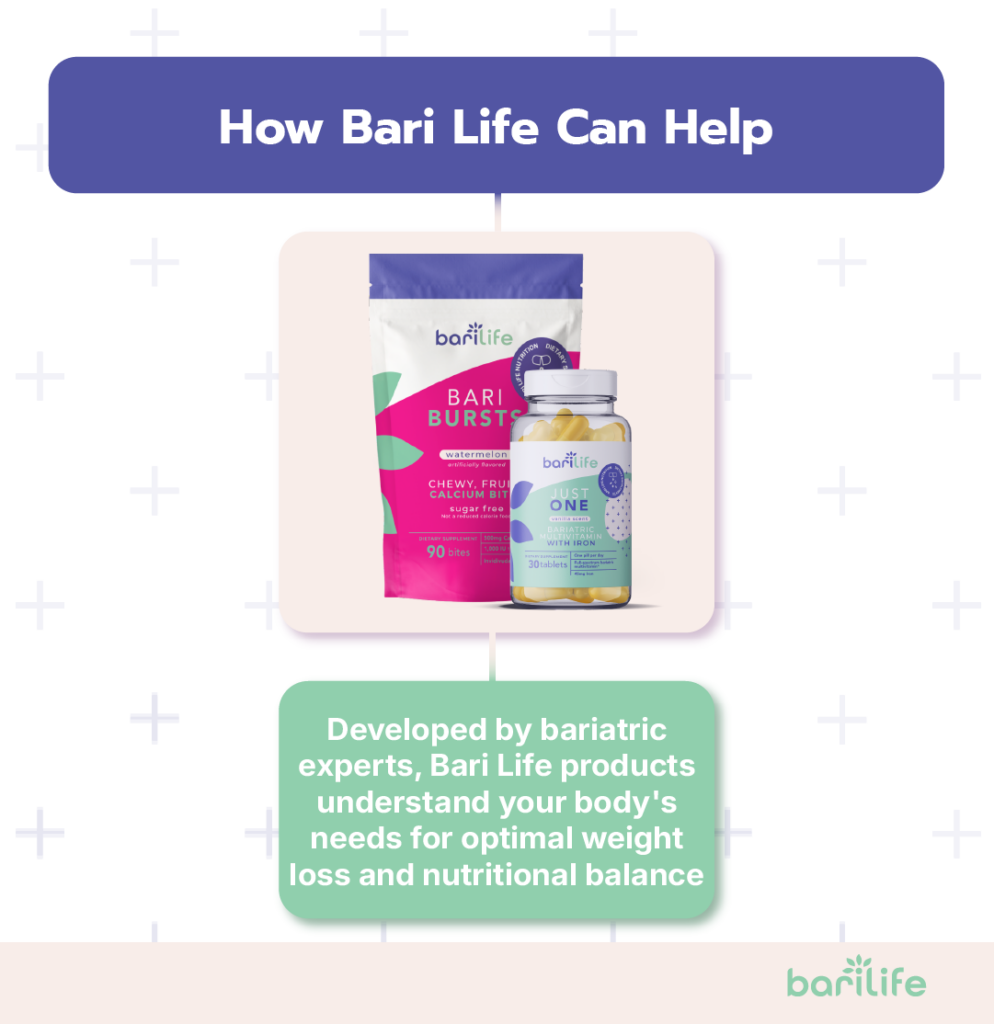
Bari Life products are developed by bariatric specialists who understand exactly what your body needs to achieve optimal weight loss while preventing nutritional deficiencies.
After bariatric surgery, it’s crucial to choose the right supplements to support your journey. Bari Life offers a full range of bariatric vitamins, including bariatric vitamins chewable for those who prefer an easier-to-digest option. Our comprehensive selection ensures you get everything you need, from bariatric multivitamins to a bariatric multivitamin with iron, formulated specifically for your unique post-surgery needs.
In addition to vitamins, we understand the importance of high-quality protein for recovery and long-term success. That’s why we offer delicious bariatric protein shakes and convenient bariatric protein bars to help you meet your daily protein goals with ease.
Maintaining strong bones is another priority after surgery. Bari Life provides tasty bariatric calcium chews that make it simple to get the calcium your body needs. For those who prefer an easy-to-absorb option, we also offer a liquid bariatric vitamin that ensures maximum absorption without hassle.
Hair thinning can be a concern after weight loss surgery, which is why our bariatric vitamins for hair loss are specially formulated to support healthy hair regrowth and overall vitality.
Digestive health is key too, and our specialized bariatric probiotic can help maintain a healthy gut, supporting nutrient absorption and overall well-being.
Finally, if you’re looking for nutritious, satisfying treats that won’t derail your progress, our range of bariatric snacks offers delicious options that fit perfectly into your post-surgery diet plan.
Visit Bari Life today to discover how our specialized bariatric vitamins, supplements, and snacks can help you achieve the fastest, healthiest weight loss possible after your surgery!
Resources
Sleeve Gastrectomy also known as Vertical Sleeve Gastrectomy (VSG). (N.D.). UCLA Health.



What are your tips and tricks to post-bariatric success?